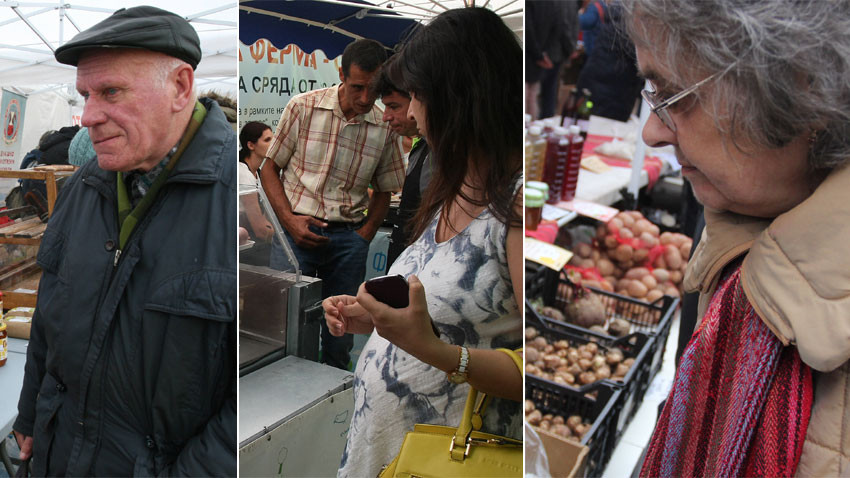
On January 1 the salaries in Bulgaria’s budget sphere increased with 10%. According to latest data of the National Statistical Institute, quoted by Trud daily, only 11.3% of the Bulgarians receive over EUR 370 per month.
The average annual income per capital in Bulgaria amounts to EUR 2.856 or EUR 237 per month. Although the average monthly salary has exceeded EUR 550, the money in each Bulgarian household is distributed among all family members. That is why even if one of the parents receives a good salary, the average household income falls significantly when the family consists of pensioners, unemployed or children. It turned out that 7.7% of the Bulgarians or 5.5% of the Bulgarian households live with under EUR 92 per month. Bulgaria has a population of less than 7 million, which means that over half a million people in this country rely on this meager amount of money. 30% of the Bulgarians receive monthly incomes between EUR 130 and 200. These revenues include salaries, pensions and social benefits and payments. Even the incomes of the 11% most well-to-do people in Bulgaria are lower as compared to the well-off citizens of other EU member states. The average annual income of the most well-to-do Bulgarians is nearly EUR 6,700, which is nearly EUR 562 per month. It is interesting to note that the volumes of loans borrowed by the poorest households with unemployed citizens and the people with highest incomes are almost the same. Of course, the people from the highest income group have biggest bank savings. The average bank deposits of these Bulgarian households amount to EUR 1,457 per year while the poorest households have almost no bank savings.
According to official statistics, revenues influence the lifestyle of the Bulgarian people as well. The wealthiest Bulgarians spend 24.2% of their incomes on food, whereas the poorest people spend 44% of their money on food. The well-to-do Bulgarians spend 5.9% of their incomes on education and recreation and the poorest ones spend only 2.1% of their incomes on recreation and education. The well-off Bulgarians eat an average of 2,567 calories per day, which is 42% more than the energy content of the food eaten by the poorest citizens. The poorest Bulgarians mainly eat bread and pastry, whereas the food menu of the most well-to-do people is much richer. Statistics also shows that natality rate among the poorest people is highest and the big households rely mainly on social benefits. The life of the families with two or more children is much more difficult than the families with no children or families whose children have grown up and started work. The average annual income of the Bulgarian families with two children is nearly EUR 9.660 or EUR 800 per month for the whole household, or nearly EUR 200 per person. The people with higher incomes prefer to have one or two children, in order to ensure better education and life to their kids. The well-off people pay higher taxes as well which allows the state to pay social benefits to the large families.
Pensions account for 26.5% of the family budget of the Bulgarians, data of the National Statistical Institute shows. However, only 9.8% of the revenues of the well-to-do households are formed by pensions. This group mainly consists of active people. The high-income families also receive incomes derived from ownership of home or land, while the poorest people have no revenues from properties and rely mainly on pensions and social benefits. In Bulgaria the difference in payments between men and women is similar to the difference in wages between men and women in other members of the European Union. Men’s salaries in Bulgaria are 25% higher than women’s salaries. The difference in men’s and women’s salaries is highest in the following sectors: state administration, healthcare, social services, financial services and insurance where men’s salaries are 38% higher than women’s wages. Trud analyses the data of the National Statistical Institute and makes the following summary: The Bulgarian families must have an income of nearly 2,200 per month in order to enter the group of the well-off people.
Compiled by: Manuel Savov
English version: Kostadin Atanasov
The poverty threshold in Bulgaria was BGN 637.92 (EUR 323) per person per month in 2023. This is an increase of 21.3 per cent compared with the previous year , when the indicator was BGN 525.92 (EUR 266), the National Statistical Institute said. I..
“We are a guarantee of stability in the region,” caretaker Prime Minister Dimitar Glavchev states in an address to the Vienna Economic Forum - Sofia Meeting, 2024, the Bulgarian news agency BTA reports. Sofia is hosting the meeting of the..
In 2023, the share of young people aged up to 29 neither in employment nor in education, stands at 13.8%, as compared to 15.1% a year earlier. Compared to the other EU countries, this percentage remains high. 1/7 th of the young people who are..
The poverty threshold in Bulgaria was BGN 637.92 (EUR 323) per person per month in 2023. This is an increase of 21.3 per cent compared with the previous..

+359 2 9336 661
